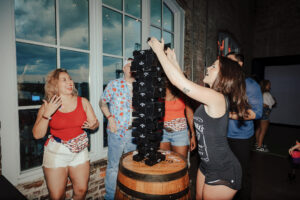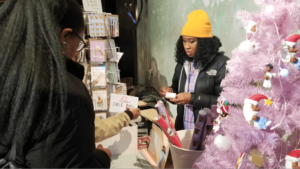Whether it’s managing worse-for-wear guests or forgetting to focus on delegates, every event organiser has learned a lesson or two along the way. Here, we speak to seven about their biggest mistakes made (and what they now do differently as a result).
Rafael dos Santos, Founder & CEO, High Profile Media
The mistake
When I started out, I tended to focus all my efforts on planning: contacting speakers, sorting out venues, and dealing with everything else that makes an event look great. The mistake? On one particular occasion, I didn’t spend any time promoting the event, and the upshot was that we had a venue ready to seat 300 (as well as huge screens and cameras) and very few actual attendees – 20, to be exact! It was an absolute disaster.
The lesson
No matter how cool your venue looks, the event’s a failure if you don’t have bums on seats. Today, my priority is promotion – once the basics are sorted, 70% of my time is spent on that.
Melissa Saunders, Freelance Marketing Consultant and EventTribe Community Manager
The mistake
A venue (now closed) once hosted a pet-based event organised by a client that was aimed at promoting responsible pet ownership. However, some individuals took exception to a photo of an animal performing a trick that was used to promote the event. Of the resulting 200 or so social posts criticising the event, which included death threats aimed at the venue team, only two were from people who had attended the event and many of the comments were untrue. Some were then picked up by national media and an open letter was sent to the RSPCA. In the end, it took the venue team two weeks to get it under control (despite the venue having a well-documented pro-animal record).
The lesson
Anything involving animals can be highly inflammatory. Added to that, the outside world generally doesn’t differentiate between an event organiser and a venue, particularly if the venue has the bigger following and the more well-recognised brand. And finally, during times like these, having an experienced crisis management professional on hand can be invaluable!
Justin Crane, Director, The Crane Event
The mistake
Very early on in my career, I organised a fringe event that coincided with a bigger city event. Despite having a wall planner above my desk where the date was highlighted and circled, I hadn’t checked with our suppliers that they had the same date in their diaries. It turned out that they didn’t, something we only realised with days to go. After a few stressful conversations and tense words, we managed to make it happen – but it was anything but smooth sailing.
The lesson
Never forget the basics, and double and triple check everything. Sharing knowledge doesn’t mean relinquishing power; it’s about ensuring everyone’s on the same page and flagging any easily avoidable misunderstandings.
Guy Eaton, Managing Director, On Event Production Co
The mistake
We always work on the premise that nothing is too much trouble – something that was certainly put to the test by one of our clients a few years ago. We were working on one of their conferences and they were repeatedly missing deadlines for artwork approval. In the end, we were forced to send everything to print at the last minute; it then had to be delivered straight to the site rather than to our workshop, which meant we didn’t get the chance to carry out our usual checks. We set up at 6pm on a Sunday and it was only as we unrolled one of the prints that we realised it was totally blank. After some frantic phone calls, we got through to our printer who, fortunately for us, happened to be in the office catching up on some admin. We managed to get a re-print dispatched by courier just in time – and thankfully, before any of the delegates arrived – but it felt like a pretty close shave.
The lesson
Firstly, pick quality suppliers – in this instance, our printers were prepared to get to work straight away to put the mistake right. Secondly, don’t be bullied by clients – deadlines are there for a reason and this wouldn’t have happened if the artwork had been signed-off on time. Thankfully, it all worked out well in the end!
Nick de Haan, Director, Wonder Fields Festival
The mistake
Looking back, my biggest mistake was having a naïve approach to time management and the commitment required to set up a grassroots music festival. Four years ago, when we founded Wonder Fields, the idea of working all year for one weekend in June was alien to me. Now it seems like a pre-requisite. Back then, I chose to dedicate one day of the week to festival planning and wouldn’t work on anything Wonder Fields-related at any other time. Although I thought I was being organised, this approach meant that the whole process was more complex and stressful than it needed to be.
The lesson
When it comes to your own business or festival, you can never completely switch off; it’s important to have a flexible approach when it comes to preparation. I now spend 12 months planning the festival and set myself deadlines well in advance of requirements, resulting in a calmer, more relaxed atmosphere at Wonder Fields HQ. For me, a small, grassroots event isn’t a get-rich-quick scheme; it’s something that requires long-term commitment and focus. As festival organisers, we operate in a high-risk and saturated marketplace: without a flexible approach and rigorous planning, you’re immediately putting yourself at a disadvantage.
Gary Peters, Director, Evolve Events
The mistake
Many of our biggest mistakes occur when alcohol is involved – and this is no different in the world of event planning. When I first became an event planner, I hosted a Christmas party where we had a conjurer perform on stage. He ended up requesting two members of the rather inebriated crowd to help him with a magic trick – a trick that involved a piece of rope being tied around our brave conjurer’s neck. The two helpers were asked to gently tug on the rope to release him… a simple trick but one that could have ended disastrously for our poor conjurer due to our intoxicated volunteers who embraced their task with just a bit too much enthusiasm.
The lesson
It’s important to manage alcohol consumption; dealing with a guest who’s over-indulged at the bar can be a nightmare. Your client might ask for free-flowing booze, but it’s important to monitor the amount of alcohol served. Make sure you balance booze with food and brief your bartenders to watch out for potentially worse-for-wear party-goers. It’s also a good idea to appraise your client’s party style and match entertainment accordingly!
Jason Allan Scott, events professional and speaker
Mistake made
I was managing an awards party when a slight miscalculation with the air conditioning meant a huge ice sculpture started melting. At first, only a few people noticed, but it soon became a real talking point. Would it topple onto the stage or onto the VIP table? Thankfully it crashed to the floor between both (much to everyone’s amusement).
The lesson
You can prepare as much as possible, but sometimes it’s important to accept that it won’t always go off without a hitch. Plus, at moments of crisis, asking for help is crucial: people, resources and solutions tend to appear when you admit you really need them.
Conclusion
In many cases, to fail is to learn – the hope is that once a mistake is made, it won’t be repeated. But we can also prepare for catastrophe – download our Event Preparedness Playbook to get started and ensure that you are equipped to deal with the social media backlash if things do go wrong. We have you covered!



